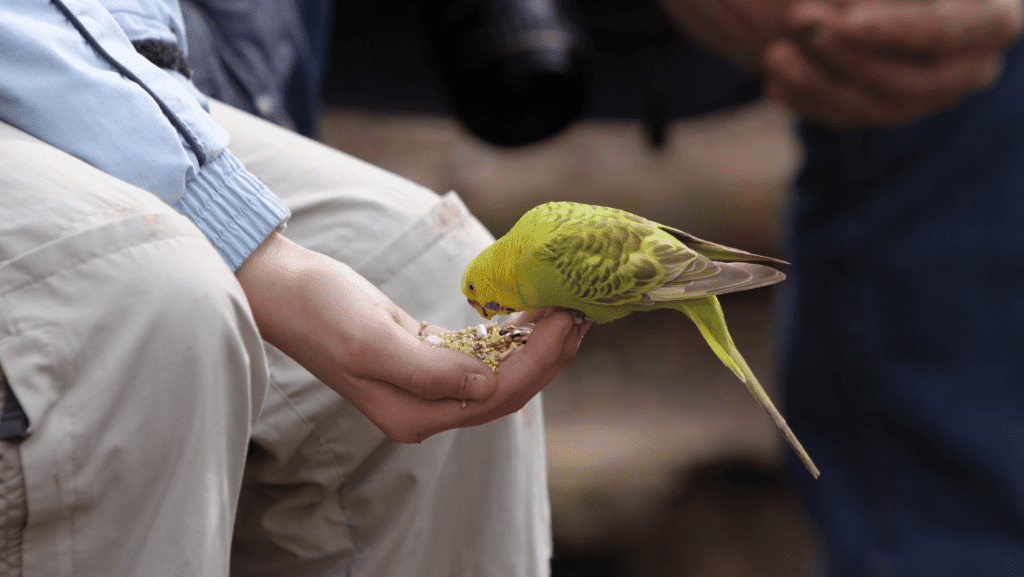Chickens aren’t picky when it comes to food, but they also have their favorites which they seem to go into a frenzy over. But just because they love eating something doesn’t always mean it’s good for them.
If you’ve got parakeets and are short on chicken feed, you may be wondering: can chickens eat parakeet food?
Although chickens can eat parakeet food and there are some nutritional benefits, there are also things to be wary of. Here we go through everything you need to know when feeding your chickens parakeet food.
Can Chickens Eat Parakeet Food?
Not only can chickens eat parakeet food, but they go crazy for it too. Parakeet foods typically contain a mixture of grains and seeds. The grains, such as barley and wheat, provide a good source of carbohydrates. The seeds, usually sunflower seeds, millet seeds, and flax seeds are healthy for chickens.
But although the parakeet food does contain so much good nutritious food, it shouldn’t be used as a substitute for normal chicken layer pellets or seed mixes. This is because each specific bird feed is designed to cater to that specific animal.
For example, Birdseed mixes such as parakeet food are designed to meet the nutritional needs of birds much smaller than chickens. They’re usually high in fat and might be too low in vitamins to be considered healthy for chickens in large amounts. For this reason, they should be presented as a supplement or as a treat rather than a replacement.
Mix it with their regular food to introduce a bit of natural enrichment, scatter some in the yard for foraging, or add some into your next table scrap mix for your chickens!
Nutritional Benefit of Parakeet Food for Chickens

As a treat, parakeet food and other bird mixes, including bird seed and wild bird seed, can be quite healthy for chickens, as it contains high amounts of some nutrients the chickens don’t receive as often.
Parakeet pellets and treats are typically made of ground corn, ground oat groats, ground wheat, ground millet, and ground barley, all of which are super healthy for chickens.
Parakeet seed mixes are made with a mix of sunflower seeds, flaxseeds, and millet seeds. Some contain dried fruits and vegetables like kale, sweet potatoes, parsley, alfalfa, and berries. To match dietary requirements, these seeds are often sprinkled with a type of vitamin-fortified powder.
After all, Parakeet food is designed to meet the nutritional needs of birds. They’re packed with vitamins A, E, D3, and B-complex, as well as calcium, protein, and omega-3 fatty acids. Manufacturers also add prebiotics and probiotics to help to support the digestive tract of the bird.
Since chickens and parakeets are both birds, there’s no harm in feeding your chickens parakeet food. When fed in moderation, your chickens can enjoy a number of health benefits. Nutritionally-packed parakeet food reduces cholesterol levels, improves digestive health, increases egg production, and protects cell damage.
But again, parakeet feed should only be used as an occasional treat rather than a replacement for their normal diet as it hasn’t been specially picked to match the dietary requirements of chickens. The same goes for any other type of feed, such as all stock feed, game bird feed, or even turkey feed.
For this reason, it’s important to always feed your backyard chicken a normal layer feed or seed mix to constitute 90% of its diet. After all, a healthy chicken is a happy chicken.
Final Thoughts
Parakeet food is an incredible source of vitamins and minerals. Although it’s designed to meet the nutritional needs of parakeets, chickens can definitely indulge in it from time to time.
This specialized food is usually made with a mixture of chicken-safe ingredients, including sunflower seeds, flaxseeds, corn, wheat, millet, and many others. You can find most of these ingredients in regular chicken feed too.
Needless to say, parakeet food is made for parakeets. For this reason, it shouldn’t be the main source of food for your chickens. Instead, use it as an occasional treat or a supplement alongside your chickens’ regular food!
